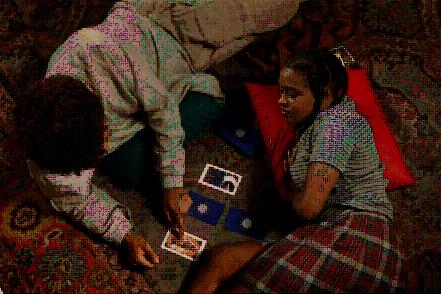
- Source: THE NEW YORK TIMES
- Author: LISA KENNEDY
- Date: MARCH 16
- Format: DIGITAL
‘Drylongso’ Review: Extraordinary
CRITIC’S PICK
Cauleen Smith’s 1998 movie, set in Oakland in the mid-90s, remains a vivid and prescient feature debut.

Will Power, left, and Toby Smith in “Drylongso." Janus Films
“Drylongso” is a Gullah-language-derived word rooted in the African American coastal communities of Georgia and South Carolina that, over time, has come to mean “ordinary.” Yet the artist Cauleen Smith’s newly restored and rereleased 1998 feature debut, about a young photographer living with her mother and grandmother in Oakland, Calif., is anything but. Or, rather, the ordinary here has value beyond the same ol’. It’s evocative, tender and rooted — all descriptions of Smith’s film, too.
By day, Pica (Toby Smith) studies art. By night, she avoids her mother’s smoky card parties by wheat-pasting activist fliers. A television in the room of her neglected grandmother warns of a serial killer targeting young Black men and women. But Pica is already acutely aware of peril: The headstrong student has been taking Polaroids of young Black men and bringing them to her 35mm-focused photography course. She’s documenting these men because, she tells her professor (played by Salim Akil, who wrote the film alongside Smith), they are in danger of becoming extinct.
Smith braids politics, friendship and romance throughout “Drylongso.” Pica befriends a young woman, Tobi (April Barnett), after witnessing her being violently kicked to the curb by a male companion. The next time Tobi and Pica cross paths, Tobi has gone incognito in male garb. A potential suitor, Malik (Will Power), rides his bike, hawks homemade T-shirts and asks Pica repeatedly, “When you gonna take my picture, girl?”
Loss will intervene. So will art. It’s not a mystery why this quiet wonder was lost in the Black cinema boom of the 1990s. The movie is rough-hewn as an artistic choice but also out of financial necessity; its D.I.Y. aesthetic mirrors the found scrap Pica uses to make meaningful memorials. But with its themes of Black endangerment (for both males and females) and its nuzzling of many genres (horror, romance, buddy flick), “Drylongso” returns to us utterly, subtly, chidingly prescient.
Drylongso
Rated R for language. Running time: 1 hour 26 minutes. In theaters.

